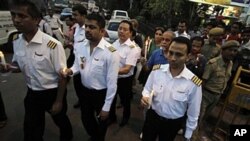A ten-day strike by pilots in India’s national carrier ended Friday night after the government agreed to consider their demands for higher wages and reinstated sacked pilots. But the work stoppage led to huge losses for the airline, and prompted calls for major reform of debt-ridden Air India.
The pilots' strike cancelled most domestic flights and stranded tens of thousands of passengers over the last 10 days. It has also turned the focus on the ailing national carrier whose losses last year topped $1.5 billion.
Who's to blame?
Analysts blame Air India’s problems on inefficient handling by bureaucrats and politicians in charge of the national carrier. Once the country’s main airline, it began facing competition from a host of private airlines after India opened up the aviation sector in the 1990’s.
Sanat Kaul is the chairman of the International Foundation for Aviation and Development in India and is a former top official of the aviation ministry. He blames Air India’s woes on poor management.
"From 2002 onwards, there has been no attempt to do something, to revamp it, to privatize it, to bring in better management. They have always been taking the soft road, and the hard realities of how to manage Air India properly has not been faced properly," said Kaul.
Losing money
Air India has been steadily losing business to private airlines. It only got 15 percent market share in March.
The latest disruption has hit Air India at a time when it is waiting for approval of a government bailout. The government injected about $200 million into the cash-strapped airline last year and has promised more money this year.
But it wants the management to lower costs and cut losses. However, the pilots strike will intensify its financial woes.
Taxpayer bailout
The latest crisis has led to a fresh debate over the wisdom of using taxpayer money to save the national carrier and led to numerous calls for privatization of the airline. Aviation expert Sanat Kaul supports these calls.
"Now with the heavy debt, the liabilities and the way in which the pilots have behaved there is very little option left about how to improve the airline within the public sector in India because Indian public sector has a lot of baggage. It is not run on private lines. So one thing they can do is to think in terms of privatization again, of course the value of the airline is very, very rock bottom now," Kaul said.
Analysts say the problems afflicting Air India are common to many enterprises run by the government. The government owns hundreds of companies such as hotels, factories and textile mills, but complaints of inefficiency and corruption in the management of these public sector units are common.
India Airlines Strike Called Off




